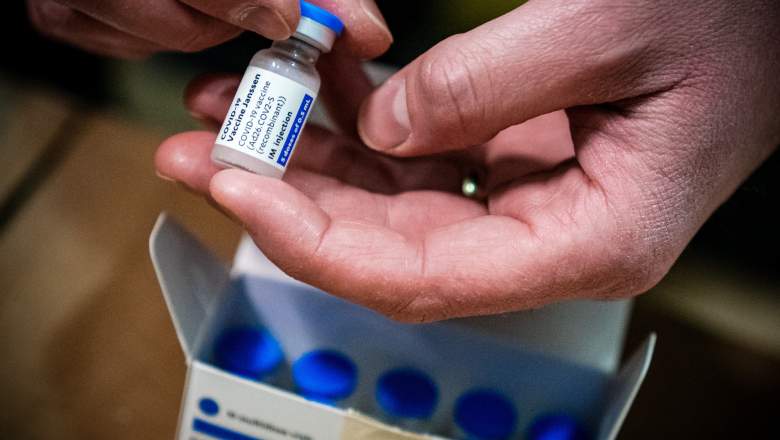
The FDA and CDC have called for a pause to the Johnson & Johnson COVID-19 vaccine in the United States while they investigate a possible connection to a very rare blood clotting condition called cerebral venous sinus thrombosis. This is the same condition that was ultimately indicated as a very rare side effect for the AstraZeneca vaccine. The symptoms for this blood clotting condition are listed below.
Here Are the Clotting Symptoms
So far, six people in the U.S. developed the rare clotting condition after receiving the Johnson & Johnson vaccine, The New York Times reported. They were women aged 18 to 48, and one died while one was hospitalized. About 7 million people have received the vaccine in total so far.
This is the same rare blood clotting condition associated with the AstraZeneca/Oxford vaccine. The Guardian reported that with the AstraZeneca vaccine, the MRHA estimated that about one in 100,000 young adults who received the vaccine could be at risk of developing the clot. The CDC and FDA recommended pausing the vaccine while the correlation is investigated to learn more.
According to the CDC and FDA, the symptoms that might indicate the rare clotting issue include:
- Severe headache
- Abdominal pain
- leg pain
- shortness of breath
If you have these symptoms within three weeks of getting the vaccine, contact your health care provider.
MHRA lists a few additional symptoms related to the AstraZeneca clotting issue, which is the same rare blood clot:
- “A new onset of severe or persistent headache, blurred vision, confusion or seizures”
- “develop shortness of breath, chest pain, leg swelling or persistent abdominal pain”
- “unusual skin bruising or pinpoint round spots beyond the injection site.”
The CDC & FDA Recommended Pausing the Johnson & Johnson Vaccine While the Clotting Issues Are Investigated
The CDC and FDA’s joint statement reads, in part:
As of April 12, more than 6.8 million doses of the Johnson & Johnson (Janssen) vaccine have been administered in the U.S. CDC and FDA are reviewing data involving six reported U.S. cases of a rare and severe type of blood clot in individuals after receiving the J&J vaccine. In these cases, a type of blood clot called cerebral venous sinus thrombosis (CVST) was seen in combination with low levels of blood platelets (thrombocytopenia). All six cases occurred among women between the ages of 18 and 48, and symptoms occurred 6 to 13 days after vaccination. Treatment of this specific type of blood clot is different from the treatment that might typically be administered. Usually, an anticoagulant drug called heparin is used to treat blood clots. In this setting, administration of heparin may be dangerous, and alternative treatments need to be given.
CDC will convene a meeting of the Advisory Committee on Immunization Practices (ACIP) on Wednesday to further review these cases and assess their potential significance. FDA will review that analysis as it also investigates these cases. Until that process is complete, we are recommending a pause in the use of this vaccine out of an abundance of caution. This is important, in part, to ensure that the health care provider community is aware of the potential for these adverse events and can plan for proper recognition and management due to the unique treatment required with this type of blood clot.
Johnson & Johnson said in a statement on April 9: “We are aware that thromboembolic events including those with thrombocytopenia have been reported with Covid-19 vaccines. At present, no clear causal relationship has been established between these rare events and the Janssen Covid-19 vaccine.”
On April 13, Johnson & Johnson wrote in a statement:
The safety and well-being of the people who use our products is our number one priority. We are aware of an extremely rare disorder involving people with blood clots in combination with low platelets in a small number of individuals who have received our COVID-19 vaccine. The United States Centers for Disease Control (CDC) and Food and Drug Administration (FDA) are reviewing data involving six reported U.S. cases out of more than 6.8 million doses administered. Out of an abundance of caution, the CDC and FDA have recommended a pause in the use of our vaccine.
In addition, we have been reviewing these cases with European health authorities. We have made the decision to proactively delay the rollout of our vaccine in Europe.
We have been working closely with medical experts and health authorities, and we strongly support the open communication of this information to healthcare professionals and the public…
The Australian government announced that it won’t use the Johnson & Johnson vaccine in its rollout at this time, because of the similarities to the AstraZeneca vaccine, UPI reported. Both vaccines use an adenovirus vector.
READ NEXT: The latest COVID-19 deaths, cases, and updates